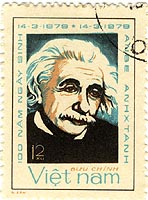Einstein’s Biographers Disprove Claim
that He was Dyslexic

The popular image that men of eminence are learning disabled promotes an aura of romanticism around the learning disabilities (LD) field. Albert Einstein, arguably the greatest scientist of all time, is usually at the top of the list of famous dyslexics.
According to LD lore Einstein failed to talk until the age of four, the result of a language disability. It is also claimed that Einstein could not read until the age of nine. To strengthen their case LD proponents point to such facts that Einstein failed his first attempt at entrance into college and lost three teaching positions in two years.
While this makes a nice story, this widely believed notion is false, according to Ronald W. Clark's comprehensive biography of Einstein, and according to Subtle is the Lord: The Science and Life of Albert Einstein, a biography by Abraham Pais (Oxford University Press, 1982).
Pais states that although his family had initial apprehensions that he might be backward because of the unusually long time before he began to talk, Einstein was speaking in whole sentences by some point between age two and three years. According to Clark, a far more plausible reason for his relatively late speech development is “the simpler situation suggested by Einstein's son Hans Albert, who says that his father was withdrawn from the world even as a boy.” Whether one accepts this interpretation, other information helps us to judge Einstein's language abilities after he began to speak.
Einstein entered school at the age of six, and against popular belief did very well. When he was seven his mother wrote, “Yesterday Albert received his grades, he was again number one, his report card was brilliant.” At the age of twelve Einstein was reading physics books. At thirteen, after reading the Critique of Pure Reason and the work of other philosophers, Einstein adopted Kant as his favorite author. About this time he also read Darwin. Pais states, “the widespread belief that he was a poor student is unfounded.”
FAILING HIS COLLEGE ENTRANCE EXAMS
True, Einstein did not pass the college exam the first time he took it. However, aside from being only sixteen, two years below the usual age, the plain fact was he did not study for it. His father wanted his son to follow a technical occupation, a decision Einstein found difficult to confront directly. Consequently, as he later admitted, he avoided following the “unbearable” path of a “practical profession” by not preparing himself for the test.
It is also true that, after graduating from the university, Einstein had difficulty finding a post. This was mainly because his independent, intellectually rebellious nature made him, in his own words, “a pariah” in the academic community. One professor told him, “You have one fault; one can't tell you anything.”
Also true is that Einstein went through three jobs in a short time, but not because of a learning disability. His first job was as a temporary research assistant, the second as temporary replacement for a professor who had to serve a two-month term in the army. Clark remarks that it is “difficult to discover but easy to imagine” why Einstein held his third job, as a teacher in a boarding school, for only a few months: “Einstein's ideas of minimum routine and minimum discipline were very different from those of his employer.”
|
Edublox programs are effective in overcoming dyslexia, dysgraphia and other learning difficulties by addressing the underlying shortcomings that interfere with academic performance.
|
|